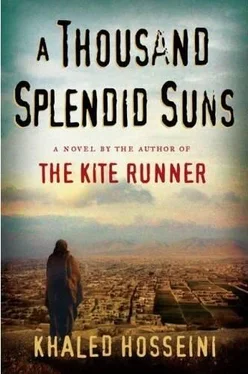* * *
THE NEXT MORNING, the day of the fatiha, a flock of neighborhood women descended on the house and took charge of preparations for the khatm dinner that would take place after the funeral. Mammy sat on the couch the whole morning, her fingers working a handkerchief, her face bloated. She was tended to by a pair of sniffling women who took turns patting Mammy's hand gingerly, like she was the rarest and most fragile doll in the world. Mammy did not seem aware of their presence.
Laila kneeled before her mother and took her hands. "Mammy."
Mammy's eyes drifted down. She blinked.
"We'll take care of her, Laila jan," one of the women said with an air of self-importance. Laila had been to funerals before where she had seen women like this, women who relished all things that had to do with death, official consolers who let no one trespass on their self-appointed duties.
"It's under control. You go on now, girl, and do something else. Leave your mother be."
Shooed away, Laila felt useless. She bounced from one room to the next. She puttered around the kitchen for a while. An uncharacteristically subdued Hasina and her mother came. So did Giti and her mother. When Giti saw Laila, she hurried over, threw her bony arms around her, and gave Laila a very long, and surprisingly strong, embrace. When she pulled back, tears had pooled in her eyes. "I am so sorry, Laila," she said. Laila thanked her. The three girls sat outside in the yard until one of the women assigned them the task of washing glasses and stacking plates on the table.
Babi too kept walking in and out of the house aimlessly, looking, it seemed, for something to do.
"Keep him away from me." That was the only time Mammy said anything all morning.
Babi ended up sitting alone on a folding chair in the hallway, looking desolate and small. Then one of the women told him he was in the way there. He apologized and disappeared into his study.
THAT AFTERNOON, the men went to a hall in Karteh-Seh that Babi had rented for the fatiha. The women came to the house. Laila took her spot beside Mammy, next to the living-room entrance where it was customary for the family of the deceased to sit. Mourners removed their shoes at the door, nodded at acquaintances as they crossed the room, and sat on folding chairs arranged along the walls. Laila saw Wajma, the elderly midwife who had delivered her. She saw Tariq's mother too, wearing a black scarf over the wig. She gave Laila a nod and a slow, sad, close-lipped smile.
From a cassette player, a man's nasal voice chanted verses from the Koran. In between, the women sighed and shifted and sniffled. There were muted coughs, murmurs, and, periodically, someone let out a theatrical, sorrow-drenched sob.
Rasheed's wife, Mariam, came in. She was wearing a black hijab. Strands of her hair strayed from it onto her brow. She took a seat along the wall across from Laila.
Next to Laila, Mammy kept rocking back and forth. Laila drew Mammy's hand into her lap and cradled it with both of hers, but Mammy did not seem to notice.
"Do you want some water, Mammy?" Laila said in her ear. "Are you thirsty?"
But Mammy said nothing. She did nothing but sway back and forth and stare at the rug with a remote, spiritless look.
Now and then, sitting next to Mammy, seeing the drooping, woebegone looks around the room, the magnitude of the disaster that had struck her family would register with Laila. The possibilities denied. The hopes dashed.
But the feeling didn't last. It was hard to feel, really feel, Mammy's loss. Hard to summon sorrow, to grieve the deaths of people Laila had never really thought of as alive in the first place. Ahmad and Noor had always been like lore to her. Like characters in a fable. Kings in a history book.
It was Tariq who was real, flesh and blood. Tariq, who taught her cusswords in Pashto, who liked salted clover leaves, who frowned and made a low, moaning sound when he chewed, who had a light pink birthmark just beneath his left collarbone shaped like an upside-down mandolin.
So she sat beside Mammy and dutifully mourned Ahmad and Noor, but, in Laila's heart, her true brother was alive and well.
The ailments that would hound Mammy for the rest of her days began. Chest pains and headaches, joint aches and night sweats, paralyzing pains in her ears, lumps no one else could feel. Babi took her to a doctor, who took blood and urine, shot X-rays of Mammy's body, but found no physical illness.
Mammy lay in bed most days. She wore black. She picked at her hair and gnawed on the mole below her lip. When Mammy was awake, Laila found her staggering through the house. She always ended up in Laila's room, as though she would run into the boys sooner or later if she just kept walking into the room where they had once slept and farted and fought with pillows. But all she ran into was their absence. And Laila. Which, Laila believed, had become one and the same to Mammy.
The only task Mammy never neglected was her five daily namaz prayers. She ended each namaz with her head hung low, hands held before her face, palms up, muttering a prayer for God to bring victory to the Mujahideen. Laila had to shoulder more and more of the chores. If she didn't tend to the house, she was apt to find clothes, shoes, open rice bags, cans of beans, and dirty dishes strewn about everywhere. Laila washed Mammy's dresses and changed her sheets. She coaxed her out of bed for baths and meals. She was the one who ironed Babi's shirts and folded his pants. Increasingly, she was the cook.
Sometimes, after she was done with her chores, Laila crawled into bed next to Mammy. She wrapped her arms around her, laced her fingers with her mother's, buried her face in her hair. Mammy would stir, murmur something. Inevitably, she would start in on a story about the boys.
One day, as they were lying this way, Mammy said, "Ahmad was going to be a leader. He had the charisma for it. People three times his age listened to him with respect, Laila. It was something to see. And Noor. Oh, my Noor. He was always making sketches of buildings and bridges. He was going to be an architect, you know. He was going to transform Kabul with his designs. And now they're both shaheed, my boys, both martyrs."
Laila lay there and listened, wishing Mammy would notice that she, Laila, hadn't become shaheed, that she was alive, here, in bed with her, that she had hopes and a future. But Laila knew that her future was no match for her brothers' past. They had overshadowed her in life. They would obliterate her in death. Mammy was now the curator of their lives' museum and she, Laila, a mere visitor. A receptacle for their myths. The parchment on which Mammy meant to ink their legends.
"The messenger who came with the news, he said that when they brought the boys back to camp, Ahmad Shah Massoud personally oversaw the burial. He said a prayer for them at the gravesite. That's the kind of brave young men your brothers were, Laila, that Commander Massoud himself, the Lion of Panjshir, God bless him, would oversee their burial."
Mammy rolled onto her back. Laila shifted, rested her head on Mammy's chest.
"Some days," Mammy said in a hoarse voice, "I listen to that clock ticking in the hallway. Then I think of all the ticks, all the minutes, all the hours and days and weeks and months and years waiting for me. All of it without them. And I can't breathe then, like someone's stepping on my heart, Laila. I get so weak. So weak I just want to collapse somewhere."
"I wish there was something I could do," Laila said, meaning it. But it came out sounding broad, perfunctory, like the token consolation of a kind stranger.
"You're a good daughter," Mammy said, after a deep sigh. "And I haven't been much of a mother to you."
Читать дальше












